(The 1979 Trial for the Murders of Harvey Milk and George Moscone)
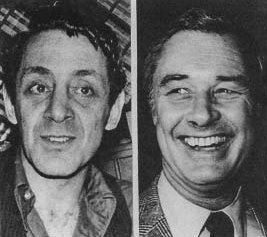
Dan White wanted his job back. Days after resigning his position as one of San Francisco's eleven supervisors, he had second thoughts, and asked Mayor George Moscone to reappoint him. When he learned the Mayor would not honor his request, White went to City Hall and gunned down both the mayor and San Francisco's first gay supervisor, Harvey Milk. Few expected, in White's trial the following year, that the jury would not return a murder conviction....
Background
The results on November 3, 1977 electrified San Francisco's gay community. Voters gave a landslide victory in the race for District 5 Supervisor to Harvey Milk, making him the first openly gay elected official in any large city in the United States. Milk told a cheering crowd in the Castro District, "If a gay can win, it means that there is hope that the system can work for minorities if we fight."
The same night saw the election of a very different kind of supervisor. Voters in District 8 chose as their new supervisor Daniel White, a Roman Catholic socially conservative former police officer and fire fighter. As Randy Shilts noted in his biography of Milk, The Mayor of Castro Street, "the media like quick, easy juxtapositions," and so Harvey Milk and Dan White found themselves paired together on a number of local talk shows. They used the opportunities to praise each other, and Milk told friends that he thought he would be able to work with White when the new Board of Supervisors met in January 1978.
Early on in their tenures on the Board, Milk and White got along well, considering their substantially different political outlooks. Milk urged Diane Feinstein, president of the Board, to appoint White chair of the Streets and Transportation Committee, and Milk was one of three supervisors that White chose to invite to his newborn child's baptism. When White, in April 1978, decided to lead a fight to block the building of a facility for serious juvenile offenders in his district, Milk initially indicated that he would join White in opposition. When Milk changed his mind, and provided the key vote leading to construction, relations between the two men soured.
On November 10, 1978, Dan White sent a letter to Mayor George Moscone announcing his resignation from the Board of Supervisors. He cited as a reason "personal responsibilities" which he felt "must take precedent over my legislative duties." A combination of financial pressures and feelings of frustration with his work on the board were the real reasons behind the resignation. News of White's decision to resign made Harvey Milk ecstatic: the balance of power on an eleven-member board with a six-member conservative majority would now tip in Milk's direction. Milk, learning the news in his camera shop in the Castro, told a friend, "It's just too good to believe. Now I've got my sixth vote."
Eight days after his resignation, White met with leaders of the Police Officers' Association and the Board of Realtors. Told by leaders of these organizations that his vote on the Board was critical to their interests, White reconsidered his decision. He asked the mayor to reappoint him to his seat. Moscone handed back to White his letter of resignation and said to reporters on November 18, "As far as I am concerned, Dan White is the supervisor from District 8. . . A man has a right to change his mind."
Fearing his dreams of a new liberal majority would be dashed with White's reappointment, Milk quickly arranged a meeting with Mayor Moscone. Milk stressed that reappointment would jeopardize the mayor's agenda and suggested that it might also cause a loss of support for the mayor in the city's gay community, a constituency that had thrown its support behind Moscone in the last election. After meeting with Milk, Moscone decided to back away from his earlier promise to White to reappoint him. He told White that his reappointment would only happen if he could show that he retained the substantial support of the voters in his district. Later White would tell detectives, "I could see the game that was being played, they were going to use me as a scapegoat, whether I was a good supervisor or not, was not the point. This was a political opportunity and they were going to degrade me and my family and the job that I had tried to do and, and more or less hang me out to dry."
In fact, Moscone had already made his decision. He would appoint someone else to fill White's seat. Within a few days after White asked for his job back, the mayor decided to offer it instead to Dan Horanzey. Meanwhile, White's supporters gathered signatures from voters in his district urging the mayor to reappoint White. Eventually a pile of petitions about an inch high would be accumulated.
Two Dead at City Hall
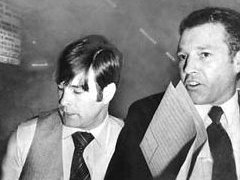
Dan White grew increasingly concerned that Mayor Moscone would appoint someone else to fill his seat on the Board of Supervisors. On the day after Thanksgiving, he met with his attorney about a motion for a restraining order to prevent the filling of his vacant seat. Later that day, White's attorney presented arguments in a hearing before Judge Mayer, but the judge ruled that White's resignation was binding, despite White's claim that the letter of resignation was submitted to the mayor when it should have been submitted to the president of the Board.
Two days later, on Sunday, White watched some football, cleaned up around the house, read a paperback, and had a brief conversation with his wife. Shortly before 11:00 p.m., as White tried to get some sleep on his couch, the phone rang. The caller was a reporter for a San Francisco television station. She told White she had just learned that the mayor had decided to appoint someone else to his seat the next day. What reaction, she asked, did White have to the news?
After a sleepless Sunday night, White brooded. At around 10:15 a.m., an aide arrived at White's house to drive him to City Hall. White carried with him a loaded service revolver and additional shells. After being dropped off at City Hall, White walked around to the back entrance and, rather than go through a metal detector, entered the building through an open window.
He proceeded to Mayor Moscone's office and told the mayor's secretary he would like to chat with him. After a short wait, the Mayor invited White into his office, where he told him he would not be reappointed. According to White's later statement, the mayor "told me it's a political decision and that's the end of it." Seeing how distraught White was, Moscone invited him to a back room for drink. As the mayor engaged in small talk, White could only think that in a few minutes the mayor would announce the appointment of a new supervisor and "lie to the press and tell them...I wasn't a good supervisor and that the people didn't want me." Then, White would later tell detective, "I just shot him."
An autopsy later revealed that the mayor was shot four times, twice in the body and twice in the head.
White left the Mayor's office through a back exit, reloading his gun as he did so. In the hallway on his way out of City Hall, White saw Supervisor Milk's aide, which (according to White) reminded him that Milk was "the most devious Board member." White understood that Milk had worked behind the scenes to deny him his reappointment. White went to confront Milk in his office. When he accused Milk of "masterminding the deal" to appoint a liberal supervisor in his place, Milk denied that he was involved. Feeling that he wasn't "getting any straight answers," White shot Milk five times, leaving him dead on his office floor.
White ran into his aide's office and yelled for his car keys. Keys in hand, he dashed out of City Hall and called his wife, Mary Ann, asking her to meet him at St. Mary's cathedral. After the meeting, White and his wife walked to a police station, where he surrendered to police. After his arrest, he gave a statement to police.
At 11:20 a.m., Diane Feinstein, standing next to San Francisco's police chief, made an announcement to the press: "As president of the Board of Supervisors, it is my duty to inform you that both Mayor Moscone and Supervisor Harvey Milk have been shot and killed. Supervisor Dan White is the suspect." The crowd let out a loud collective gasp. That night, candles in hands, a crowd of 40,000 people marched from the Castro to City Hall in a show of respect for the fallen mayor and the leader of San Francisco's gay movement.
The Trial
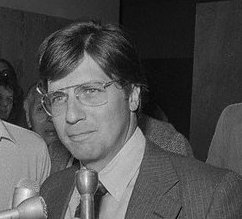 Defense attorney Douglas Schmidt
Defense attorney Douglas Schmidt
Defense attorney Douglas Schmidt accepted the obvious: any defense based on a claim of actual innocence was a sure loser. His client had gunned down two city leaders in cold blood and everyone knew it. Schmidt decided that White's best hope to avoid a murder conviction was a diminished capacity defense that might convince a jury to convict his client on a lesser charge of manslaughter. The defense attorney began assembling a group of witnesses, including friends of White and psychiatrists, who could present White as a troubled, depressed man who snapped under terrible financial and family pressures.
When jury selection in the Dan White trial began, Schmidt focused on making sure that no homosexuals made the jury. He asked potential jurors, "Have you ever supported controversial causes, like homosexual rights, for instance?" Those persons admitting that they did, or whom Schmidt suspected of actually being gay, he sought to have excluded. Schmidt tried to seat as many working-class and Catholic jurors as he could, despite the fact that those were the jurors who--in a normal criminal trial--would be the very type of jurors most likely to side with the prosecution. After three days of questioning, and with prosecutor Thomas Norman using only six of his twenty-six peremptory challenges, a jury much to Schmidt's liking was seated.
On May 1, 1979, with his client seated at a table behind a bullet-proof plastic wall, Doug Schmidt told jurors in his opening statement, "Good people, fine people, with fine backgrounds, simply don't kill people in cold blood. It just doesn't happen and obviously some part of him has not been presented thus far." Schmidt suggested that the evidence would show his client to have undergone a "vile biochemical change" that pushed him over the edge to violence. He said White "was supremely frustrated with crime and the politics of the city" and that he "saw the city deteriorating as a place for the average and decent people to live."
Tom Norman, in his opening statement for the state, told jurors that the evidence he would present would prove the three elements of first-degree murder: premeditation, deliberation, and malice. For the most part, his speech simply recited the events of November 27 that left two men dead in pools of blood.
The state's case took only three days. Coroner Boyd Stevens testified that Milk was shot twice at close range in the back of the head. Several witnesses, including Cyr Copertini (secretary to the mayor) and William Melia (aide to Milk), described White's movements around City Hall on the morning of the shooting and told of hearing gunshots. Rudolph Nothenberg, a deputy to Mayor Moscone, confirmed that the mayor had planned later on the morning of the 27th to announce the appointment of Dan Horanzey to fill White's vacated seat on the Board of Supervisors. Diane Feinstein, the new mayor of San Francisco, testified that she had tried to talk to White at City Hall on the morning of the shootings, but he said "just a moment" and headed down the hall to Milk's office. Feinstein "heard the door close" and then "the unmistakable shots." She told jurors that after the first shot she first assumed that White shot himself, but then heard "additional shots" and "knew that something was wrong." She opened the door to Milk's office, "saw his body" and "tried to get a pulse, but could not." The final witness for the state was Inspector Frank Falzon, one of two detectives who interviewed White shortly after the shootings at City Hall. Norman handed to Falzon People's Exhibit #54, a cassette tape prepared during the November 27, 1978 interview and asked him, "Has it in any way been changed, erased, altered, or added to?" Falzon said that it had not, and the tape of White tortured confession was played for the jury. The tape brought four jurors to tears. In cross-examination by Schmidt, Falzon called White "a man among men" who, on the day of the killings, had become "a shattered individual." He was not the White that Falzon had known and admired during his years on the force.
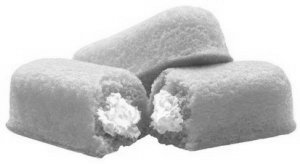
Doug Schmidt built the defense case around the testimony of a series of psychiatrists who told jurors that Dan White was so depressed, so sleep deprived, so bloated on junk food, that he lacked the capacity to premeditate and deliberate that was required to convict him of first-degree murder. This defense, called a diminished capacity defense, was dubbed by the press "the Twinkie defense" after psychiatrist Dr. Martin Blinder said that White might have been thrown off kilter by "gorging himself on...Twinkies." According to Blinder, research suggests that junk food binging potentially can adversely affect mental states: "[T]here is a substantial body of evidence that in susceptible individuals large quantities of what we call junk food, high sugar content food with lots of preservatives, can precipitate anti-social and even violent behavior. There have been some studies, for example, where they have taken so-called career criminals and taken them off all their junk food and put them on milk and meat and potatoes, and their criminal records immediately evaporate."
In addition to White's dietary issues, psychiatrists noted that White suffered from bouts of depression, including several lasting four or five days each in the months leading up to the shooting. "During these spells he'd become quite withdrawn," Dr. Blinder testified, "quite lethargic. He would retreat to his room. Wouldn't come to the door. Wouldn't answer the phone. Would call in sick. Wouldn't even sleep with his wife; would sleep on the couch outside. And during these periods he found that he could not cope with people." Blinder suggested that the Twinkies and doughnuts were a response to his depression: "[H]e'd consume ever more junk food" and "the more junk food he consumed, the worse he'd feel."
Other defense witnesses testified that White was under tremendous financial and family pressures in 1978. White's aide, Raymond Shine, testified that her boss was "frustrated a lot" that he wasn't spending enough time with his new child. "He didn't want his child to be with a baby sitter," Apcar told jurors. Apcar also testified that White felt financially pressured.
Apcar and a string of White's friends testified that the White they knew in the past was a model individual--"calm and confident," in the words of one witness. Raymond Shine told a story of White saving him from a probable drowning while on a sailboat trip. Shine said he "was really shocked and surprised" that his friend shot and killed Moscone and Milk. The implication jurors should draw from this testimony, Schmidt clearly hoped, was that White was a stand-up, decent guy who went careening off the tracks in the fall of 1978. Schmidt largely steered the defense witnesses clear of discussion related to White's frustration with the politics of the Board of Supervisors (despite a reference to political divisions in his opening statement). Most likely, Schmidt came to the conclusion that political frustrations were the source of a motive unlikely to be excused by the jury.
The heart of Schmidt's defense consisted of testimony from psychiatrists suggesting that White's severe depression prevented him from weighing the consequences of his actions in City Hall when he confronted Moscone and Milk. Dr. Jerry Jones, for example, testified, "I don't think that when a person is in the midst of a major depression that they are capable of mature and meaningful reflection." Jones told jurors that White "was enraged and anxious and frustrated, all in addition to the underlying depression, and it's in that context that he comes forward with the shooting." He concluded that White "did not have the ability to control himself."
After the defense rested its case, the prosecution offered rebuttal testimony from its own psychiatrist, Dr. Roland Levy. Levy testified that during his interview of White, the defendant showed little remorse. White admitted to having suffered through financial and family difficulties, but told Levy that he did not have a history of psychiatric problems. Levy described White as "a rather rigid sort of individual," but not a person suffering from any mental disorders. Asked by Norman whether the defendant was depressed, Levy replied, "I had the feeling that...there was some depression, but it was not depression that I would consider a diagnosis." Levy concluded that he "found nothing" that indicated White lacked the capacity to premeditate or deliberate on the day of the shootings.
One of the state's last rebuttal witnesses was Supervisor Carol Silver, whose testimony was sought to persuade jurors that these were politically motivated killings, not just shooting brought on by depression and junk food. Silver testified about the friction that developed between White and Milk after Milk cast a vote in support of locating a facility for juvenile offenders in White's district. Silver testified, "Dan seemed to have counted on Harvey's vote" on the issue, and when Milk voted against him "Dan was very hostile to Harvey."
In his brief, but emotional summation, Douglas Schmidt described White as "a man with a fine background" whose "pot had boiled over." He assured jurors that his client would suffer severe punishment, even if they returned a manslaughter, rather than a murder, conviction. "He will be punished," Schmidt said, "His child and his family will have to live with this. God will punish him....Just justice, that's all."
After thirty-six hours of deliberation, the jury said that they had reached a verdict. On May 21, Judge Walter Calvagno asked the jury foreman, "Has the jury reached a verdict in this case?" The foreman announced that the jury had found White guilty only of voluntary manslaughter in the killings of both Moscone and Milk.
Epilogue
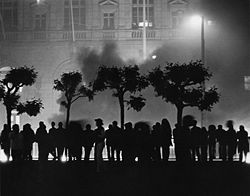
Following announcement of the verdict, an angry crowd began to form in San Francisco's Castro District. A throng of thousands, chanting things such as "Avenge Harvey Milk!" and "Kill Dan White!" began marching toward City Hall. Some members of the crowd hurled stones through the windows of City Hall, while others ripped grillwork off of doors. When police appeared, they were greeted with a barrage of rocks and chunks of asphalt. Police cars were set on fire. Eventually, the police resorted to tear gas and began trying to round up groups of rioters. Only after many tense hours was order finally restored to the city.
Judge Calvagno sentenced White to a seven-year sentence. After less than five years at Soledad State Prison, White was paroled on January 7, 1984. Less than two years after his release, on October 21, 1985, White entered the garage of his San Francisco home and attached a garden hose to the exhaust pipe of his car.
